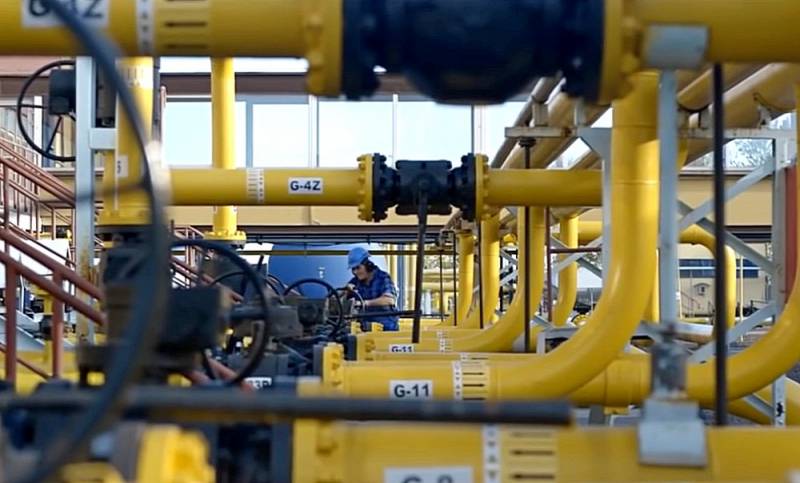Why Russia is creating a man-made energy crisis in Europe
Unbelievable, but it is a fact. Russia "joined the economic sanctions against Belarus." In any case, such an impression may develop after reading news that Gazprom cut gas pumping through the Yamal-Europe pipeline by more than 8 times. This means that Minsk will receive less transit income, which may be critically important for it in the context of limited foreign exchange earnings. So why did Moscow de facto join the EU sanctions against its only western ally?
Indeed, from the outside it all looks very strange. The European Union has introduced restrictive measures against the Belarusian export of potash fertilizers, oil and oil products, and here we are throwing problems at the "Old Man" too. In Ukraine, spiteful amusement is being made, seeing the obvious relationship between Gazprom's decision and the upcoming launch of the Nord Stream 2 pipeline. But why then do we punish Minsk, and not Kiev, which, in theory, should be afraid of most of all? Let's try to figure it out.
Seriously though, Belarus looks like an accidental victim caught between the geopolitical millstones. Most likely, the domestic monopolist was aiming not at her, but at neighboring Poland, and the Belarusian brothers got, as they say, for the company. As you know, Warsaw is actively promoting the idea of turning its country into a major regional gas hub. In 1999, the Yamal-Europe trunk pipeline was put into operation, which runs from Russia through Belarus and Poland to Germany. Its design capacity is 32,9 billion cubic meters of gas per year. Following President Putin's memorable Munich speech, Warsaw made a strategic decision to break its dependence on Russian gas supplies:
Over the past four years, PGNiG has taken fundamental steps to diversify its natural gas supplies to Poland. The company has entered into long-term LNG supply contracts and is acquiring gas fields on the Norwegian continental shelf.
An LNG terminal was built in the Baltic with a capacity of 5 billion cubic meters per year, and work is underway to expand it to 7,5 billion cubic meters. In addition to it, a floating LNG terminal should appear in Gdansk. The Poles expected to receive up to 10 billion cubic meters of gas from Norway via the Baltic Pipeline. In addition to this, there were ideas to somehow close the Yamal-Europe gas pipeline for the internal needs of Poland itself, connecting it with the coastline with bridges. Well, and, of course, the Trimoria project looked very tempting, within the framework of which a gas transmission network virtually independent of Western Europe should be built from the Baltic to the Adriatic and the Black Sea, closed to the seaside terminals built in Poland and Croatia. In fact, Warsaw was to become Washington's main trade representative for the supply of its liquefied natural gas in the Old World.
It is clear that in order to realize such ambitions it is necessary to “clear the clearing” from competitors. Poland has consistently acted as one of the main opponents of the Russian-German Nord Stream 2. But any action, as is customary in the Universe, has a reaction. Some time ago, the Polish Baltic Pipeline had some unexpected problems with field and bats due to the stringent environmental requirements of Denmark. Behind the appearance of such difficulties, we saw the backstage intrigues of Berlin, trying to substitute a leg for Warsaw, about which in detail told earlier. And now Moscow has made its move.
It is reported that Gazprom is suspending the Yamal-Europe gas pipeline for preventive maintenance for the period from 6 to 10 July, as well as the Turkish Stream from 22 to 29 June. In addition to this, the Russian monopoly is multiplying the subsequent pumping of gas through the main pipeline going to Germany through Belarus and Poland. In Europe, they attacked the domestic state corporation with harsh criticism that it refuses to increase supplies, despite the growth in consumption, which in fact leads to a shortage of energy resources and an increase in their prices. The cost of 1 thousand cubic meters there now reaches $ 360. It would seem, take it and swing it, but no. Russia is taking a different path.
To tell the truth, Gazprom is really tightening the valve to the Old World, acting strictly within the established procedures. Why, it's clear. The situation in the European Union is such that it is now very convenient to create a small, man-made energy crisis there, so that Brussels would not be too fiddly with the certification and launch of Nord Stream 2. It is obvious that Berlin and Moscow are jointly putting a spoke in the wheels of Warsaw's gas ambitions. The fact that Belarus is suffering economically is the cost of “friendly fire”. However, it is possible that the Kremlin is not averse to slightly additional “marinating” President Lukashenko in order to make him even more accommodating in the matter of real integration within the framework of the Union State of the Russian Federation and the Republic of Belarus. Until 2024, Kiev is protected by a transit agreement with Gazprom, but Minsk is not. It happened…

Information